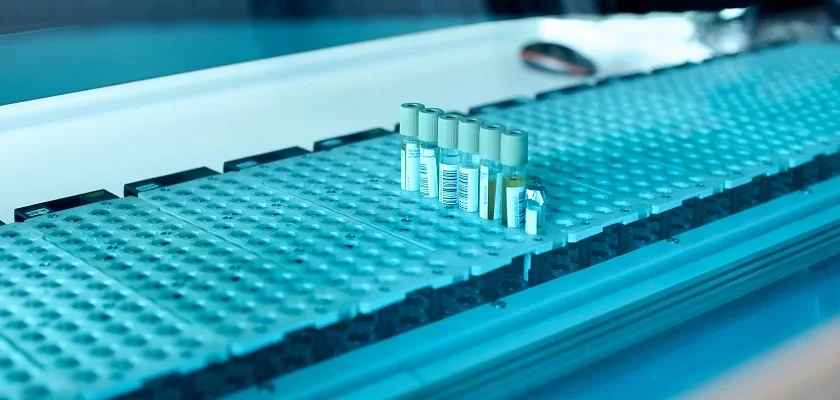Exploring the Potential Impacts of Livagen Peptide in Scientific Research
- Updated on: May 16, 2025
- Published on May 16, 2025

Livagen peptide is a relatively underexplored molecule in peptide-based research. Studies suggest its intriguing properties offer insight into cellular functions, metabolic processes, and biological mechanisms. Although its precise role in various organisms is still a subject of ongoing research, the peptide’s properties suggest potential implications in diverse scientific domains such as cell biology, regenerative science, and metabolic research. This article explores the possible uses of Livagen peptides in these fields, focusing on their possible impact on cellular processes, tissue regeneration, and metabolic regulation.
Structure and Characteristics of Livagen Peptide
Livagen peptide, a synthetic peptide composed of a specific sequence of amino acids, is designed to mimic or modulate certain biological pathways within organisms. Its molecular structure is believed to enable it to interact with various receptors and enzymes, supporting cellular signaling and metabolic pathways. Although the exact sequence and structural details are proprietary in certain research contexts, it has been hypothesized that the peptide may be involved in critical processes such as cellular growth, stress response, and metabolic regulation.
Peptides such as Livagen are typically designed to engage with specific biological targets, potentially mimicking or modulating endogenous signaling molecules. Research indicates that the interaction between the Livagen peptide and its targets may lead to alterations in cellular behavior, such as gene expression, protein synthesis, and metabolic adjustments. These interactions provide valuable insights into how peptides might manipulate or support cellular activity, paving the way for future research implications.
Impact on Metabolic Research
One of the most intriguing research areas related to Livagen peptide involves its potential impact on metabolic processes. Investigations purport that the peptide may have a role in regulating key metabolic pathways within organisms. These processes include glucose metabolism, lipid homeostasis, and protein synthesis. As metabolic disorders continue to be a major concern in experimental and research settings, understanding how Livagen peptide might impact these pathways may be significant.
Research indicates peptides such as Livagen might support cell energy production and consumption. This may lead to new avenues for studying metabolic diseases, such as insulin resistance, obesity, and diabetes. Investigations purport that the peptide might affect the regulation of enzymes involved in glycolysis, fatty acid oxidation, or protein turnover, which may have a cascading impact on cellular energy homeostasis. Further exploration into this area may reveal important links between peptide signaling and metabolic regulation, offering potential research models for testing new approaches to metabolic disorders.
Moreover, the peptide has also been hypothesized to regulate mitochondrial activity. Mitochondria, often called the cell’s powerhouses, play a central role in energy production. Some research suggests that the Livagen peptide may impact mitochondrial function, potentially supporting ATP production and cellular bioenergetics. This hypothesis may open up exciting prospects for studying mitochondrial diseases or other conditions where cellular energy production is impaired.
Cellular Research and Livagen Peptide
Another promising domain for Livagen peptide’s implication is speculated to lie in regenerative science. Scientists speculate that Livagen peptide might play a role in stimulating cellular growth and tissue regeneration, particularly in response to injury or stress. Studies postulate that the peptide may impact cell proliferation, differentiation, and migration processes, which are critical in wound healing and tissue repair.
Livagen peptide is also believed to support stem cell behavior, a crucial aspect of regenerative science. Stem cells may uniquely differentiate into various cell types and repair damaged tissues. It has been theorized that Livagen peptide may act on stem cells, promoting their proliferation and regenerative potential. By modulating stem cell activity, Livagen peptide may help accelerate tissue repair, making it an intriguing candidate for research into implications such as wound healing, organ regeneration, and even potential approaches for degenerative diseases.
Immunity Research
Studies suggest the peptide may also have potential uses in modulating immune responses. It has been suggested that Livagen peptide may support the activity of immune cells, such as macrophages, T cells, and dendritic cells. These cells are critical in initiating and regulating immune responses, and any alteration in their activity may profoundly affect the organism’s defense mechanisms.
Research indicates that Livagen peptide might impact the expression of cytokines and chemokines, which are signaling molecules involved in immune cell communication. Investigations purport that by modulating these factors, Livagen peptide may support innate and adaptive immune responses. This modulation type might be particularly useful in studying autoimmune diseases, inflammatory conditions, or chronic infections, where immune system dysregulation plays a central role.
Moreover, research indicates that the peptide might modulate oxidative stress, a key player in inflammation and immune responses. By reducing or controlling oxidative damage, the Livagen peptide seems to assist in regulating inflammatory pathways, providing a model for studying the impact of oxidative stress in various diseases.
Neuroprotection and Cognitive Research
Another emerging area for investigating the potential properties of Livagen peptide is neuroprotection and cognitive function. It has been hypothesized that Livagen peptide might impact neuronal survival and function, which may have implications for neurodegenerative diseases such as Alzheimer’s and Parkinson’s disease. Some findings imply that the peptide may interact with signaling pathways that regulate neuronal growth, differentiation, and apoptosis.
Neurodegenerative conditions are often characterized by the progressive loss of neurons and impaired cognitive function. Livagen peptide, with its potential to impact cellular growth and regeneration, might be a useful tool for studying mechanisms of neuroprotection. The peptide may provide valuable insights into developing new approaches to prevent or reverse neurodegenerative damage by supporting neuronal plasticity and survival.
Conclusion
The potential implications of Livagen peptides in scientific research are believed to be vast and varied, ranging from metabolic regulation to immune modulation and tissue regeneration. The peptide’s potential to support cellular processes, metabolic pathways, and even neuroprotection may make it a powerful tool for understanding complex biological systems. While much of the research remains in its early stages, the peptide’s properties might eventually open new avenues for investigating metabolic diseases, regenerative science, and cognitive disorders.
As investigations into the peptide’s molecular mechanisms continue, more precise functions and potential implications will likely be uncovered. The peptide’s potential impact on cellular growth, immune modulation, and metabolic processes may provide critical insights into the design of future research strategies, making it an exciting subject for continued research. While its possible role in various biological processes is still being explored, Livagen peptide represents a promising avenue for advancing scientific knowledge across multiple domains. Licensed professionals may buy research peptides online.
Review Process For This Article:
- Bojanowski, M. S., & Forstner, S. P. (2020). Peptides in cellular regulation: Implications in metabolic and regenerative research. Journal of Peptide Science, 26(7), e3291.
https://doi.org/10.1002/psc.3291 - Couto, M., & Fernandes, S. A. (2019). Peptides and stem cell modulation in tissue regeneration: The potential role of bioactive peptides. Stem Cell Research & Therapy, 10(1), 72.
https://doi.org/10.1186/s13287-019-1309-7 - Patel, R. R., & Gupta, A. R. (2018). Peptides in metabolic regulation: Mechanisms of action in glucose metabolism and lipid homeostasis. Metabolism: Clinical and Experimental, 87, 36-42. https://doi.org/10.1016/j.metabol.2018.07.003
- Huang, X., & Zhao, L. (2021). The role of peptides in modulating immune responses: Implications for inflammatory diseases and autoimmunity. Immunology Letters, 236, 12-19. https://doi.org/10.1016/j.imlet.2021.04.001
- Wang, Z., Li, Z., & Wang, Q. (2022). Peptides as neuroprotective agents: Insights into modulating neuronal survival and function. Neurobiology of Aging, 102, 123-131.
https://doi.org/10.1016/j.neurobiolaging.2021.12.005


